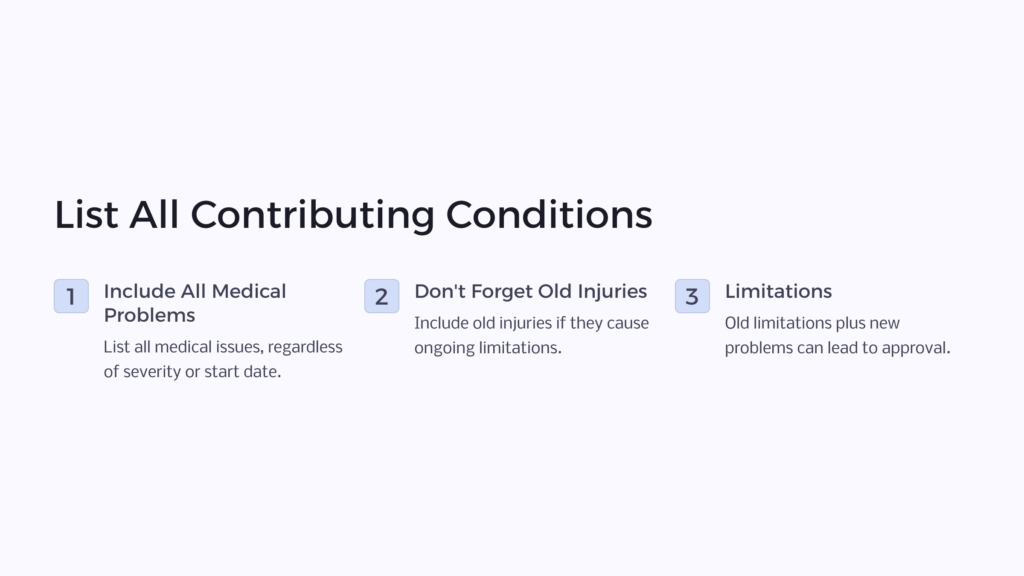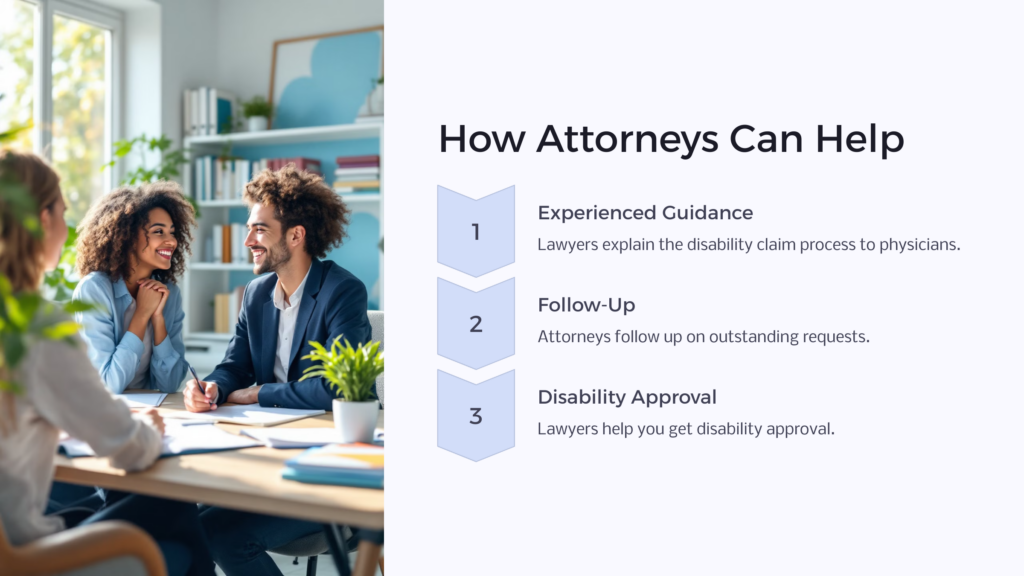Receiving a Social Security Disability approval does not need to feel like an impossible task. We want to help you find the ways to smooth out the process. They key is to follow through on every step, and you are sure to succeed.
List All the Conditions That Contribute to Your Disability

First, be sure to list all medical problems you have, regardless of how severe they are or when they began. Include old injuries if you have any ongoing limitations related to the injury. It’s easy to forget limitations that we’ve had for a long time, because we’ve learned to live with them. Sometimes old limitations combined with new problems result in a disability approval.
Be Realistic and Honest in Your Disability Claim
When completing your disability forms and talking with Social Security, it is helpful to be realistic and forthright about what you cannot do, and also about what you can do, given your condition. Be sure to avoid exaggeration. Also, at doctors’ appointments avoid telling your doctor courteously that you feel “fine” or “okay” when you do not. Be sure that your doctors know when you have medical or psychological problems that are being treated by another practitioner. Additionally, it is important to follow your physician’s guidance, including attending requested appointments and getting your prescriptions filled on time.
Be Responsive to the Social Security Disability Application Process

Another way to help your claim is to answer questions as directly and clearly as possible and to promptly respond to any written or telephone requests for additional information. If there is an unavoidable delay, let the claims examiner know that you are working on it. When answering questions, limit your answer to the specific question that was asked. If asked to go to a consultative examination with a doctor whom Social Security selects, be sure to attend and participate cooperatively.
Communicate with Your Doctors

Your chances of disability approval may also be improved if your doctors understand what Social Security expects of them. Your claims examiner will ask your treating physicians to give Social Security a report about your diagnosis, your limitations, and your capabilities. It is important that your doctor complete the report, not just with accurate information, but also in the manner requested. Some claims are denied because the treating physician doesn’t respond or doesn’t provide an adequate report. To avoid a delay caused by the need for a consultative examination, be sure that you give Social Security all the information you have about your medical conditions, and that they receive all the medical records and reports that they request from your physicians.
How Attorneys for Social Security Can Help

A Social Security lawyer can be invaluable because he or she is experienced in explaining the Social Security disability claim process to physicians and can follow-up for you on outstanding requests, helping you to get disability approval.
Would it help my disability claim to get a statement from my employer about my problems at work?
Your employer shouldn’t be expected to make a statement that you are disabled, but your employer’s observations of problems on the job could fill in some information gaps in your disability claim, especially if you have scant medical records. If you were having noticeable problems at work, then asking your employer for a letter that describes signs of your apparently health-related problems could help your claim. Some things that employers notice are excessive absenteeism, reduced mobility, loss of dexterity, reduced stamina, and the inability to sit or stand for long periods. They may have also noticed that your production has gone down or that you have difficulty completing tasks.
Employer Observations of Mental Symptoms for your Disability Claim
If you are claiming disability based on a neurological or mental illness, then your supervisor’s letter might include observations of your emotional, behavioral, or cognitive problems, such as conflicts with other employees, poor impulse control, or memory lapses. Your employer might have noticed that you were having difficulty following directions or multi-tasking in a manner required by your job. Also, if you were getting unusual assistance with your workload, that would be a good thing for your employer to mention.
The Social Security Administration rarely contacts your employer for such information so it will be up to you to request a statement either in letter form or on Social Security’s for SSA-3033, which you can obtain from this site under Commonly Used Forms. If this is uncomfortable for you, you may wish to hire an attorney who handles Social Security Disability claims to assist you with gathering appropriate information for your disability claim.
I haven’t seen a doctor much for my bipolar disorder because I don’t have insurance. How will this affect my Social Security Disability claim?
It can be difficult to get adequate medical care when you don’t have health insurance. However, it is still possible to be approved for disability benefits, even if you haven’t seen a doctor very often. Whether you have a physical or mental disability, such as a bipolar disorder, the biggest effect that a lack of medical history can have on your claim is proving when you became disabled. If the Social Security Administration doesn’t find enough information in your medical records to make a decision, they will send you to a consultative examination with a physician or psychologist that they select. If the examination and other information in your file supports that you are disabled at the time of the exam and you are still insured for disability benefits, then your claim will be approved; but the date of disability used to pay your claim may not be retroactive to the date you believe you became disabled.
Financial Impact of a Later Disability Date
If you were not insured for disability at the time of the consultative examination and lack proof of an earlier date of disability, your claim would be denied. If you were insured at the time of the exam, but lack proof of earlier disability, you would lose back benefits.
Proving When You Became Disabled and How a Disability Lawyer Can Help
There are some things you can do to help your claim. Because you don’t have the more common sources of medical evidence, a Social Security attorney could be helpful in identifying and organizing information to support your claim. For example, if you were having trouble on the job—missing a lot of work or having difficulty with tasks that you previously could do without a problem—you might get a letter from your employer with his or her observations. If your disability is due to a mental illness, your employer might include observations of your becoming frustrated, arguing with other employees, or having difficulty following instructions. The letter should include the approximate time frame in which you were having the problems.
Similarly, letters from relatives, friends, and co-workers can also help if they have observed symptoms of your physical disability. Or, if you have a bipolar disorder or other mental illness and they have been around you when you have been emotionally unstable or had functional problems due to your mental condition, they can complete a statement. You can find forms SSA-3380 and SSA-3033 right here.
At Benefits.com, we aim to point you in the right direction towards all the benefits available to you. Take our free eligibility quiz today to get started!
 Benefits.com Advisors
Benefits.com Advisors
With expertise spanning local, state, and federal benefit programs, our team is dedicated to guiding individuals towards the perfect program tailored to their unique circumstances.
Rise to the top with Peak Benefits!
Join our Peak Benefits Newsletter for the latest news, resources, and offers on all things government benefits.



















